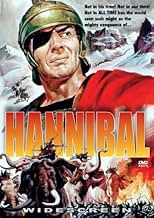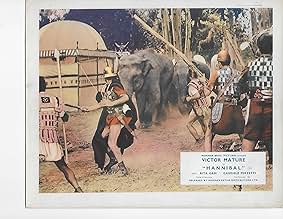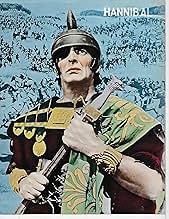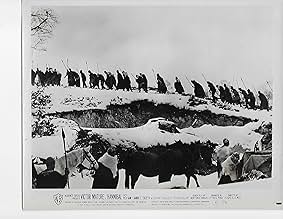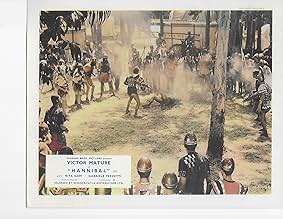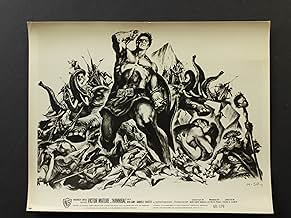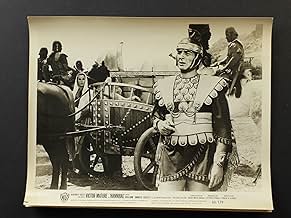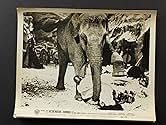ÉVALUATION IMDb
5,2/10
1,2 k
MA NOTE
Ajouter une intrigue dans votre langueDuring the Second Punic War in 218 BC, Carthaginian general Hannibal attacks the Roman Republic by crossing the Pyrenees and the Alps with his vast army.During the Second Punic War in 218 BC, Carthaginian general Hannibal attacks the Roman Republic by crossing the Pyrenees and the Alps with his vast army.During the Second Punic War in 218 BC, Carthaginian general Hannibal attacks the Roman Republic by crossing the Pyrenees and the Alps with his vast army.
Terence Hill
- Quintilio
- (as Mario Girotti)
Renzo Cesana
- Minucio
- (as Renato Cesana)
Bud Spencer
- Rutario
- (as Carlo Pedersoli)
Avis en vedette
Although touted as a Grade-B epic, such a high rating is dubious. The acting is overwrought and the plot and narrative devices are poor. The most distinguishing characteristic of this film is the cinematography -- which is simply horrendous. Over and over, there are shots of the Carthaginian Army marching somewhere -- the problem is that the march order is more akin to a company of skirmishers than it is to an army of thousands on the march. Scenes are often so dark as to be indistinguishable, and battles look like company exercises.
The Roman defeat at Cannae was the worst loss suffered by any Western army in a single day in history. Historically, the four/eight legions(opinions vary to whether double legions were present) were surrounded and destroyed in place, often because the Romans were so compressed in space that they could not effectively engage. Yet, the movie battle shows a rather open battle with large areas of maneuverability.
Much is made of Hannibal's elephants, but one must understand that only eighteen of the beasts survived the crossing of the Alps. In effect, they were the Panzers of the ancient world -- and much more effective as a terror weapon threat than an actual force multiplier.
The sub-plot of a love interest is pure Hollywood Italia -- no basis in reality. And although Fabius Cunctator was a historical figure whose "Fabian tactics" were proved correct, the movie concludes before any mention of Scipio Africanus who eventually defeated Hannibal at Zama.
The Roman defeat at Cannae was the worst loss suffered by any Western army in a single day in history. Historically, the four/eight legions(opinions vary to whether double legions were present) were surrounded and destroyed in place, often because the Romans were so compressed in space that they could not effectively engage. Yet, the movie battle shows a rather open battle with large areas of maneuverability.
Much is made of Hannibal's elephants, but one must understand that only eighteen of the beasts survived the crossing of the Alps. In effect, they were the Panzers of the ancient world -- and much more effective as a terror weapon threat than an actual force multiplier.
The sub-plot of a love interest is pure Hollywood Italia -- no basis in reality. And although Fabius Cunctator was a historical figure whose "Fabian tactics" were proved correct, the movie concludes before any mention of Scipio Africanus who eventually defeated Hannibal at Zama.
I don't know who the hell shot this, but I suppose I could glance at the credits and lay blame on the culprits, but since I'm lazy and irritated right now I'll just skip the formality and say that Victor Mature probably fired his agent several times over after being booked for this gig.
He is quite literally the only competent person thesping his role, all the while other actors are stiff, comical, and otherwise just plain unconvincing. But like I implied in my first paragraph, it's not even the acting (however bad by the supporting cast) that's the issue: It's the cinematography: It's the direction and shot set ups: It's poor scheduling of the extras so the most can be gotten out of them shot wise. It's everything from the awful costumes to the lack of historical accuracy, to the extreme lack of consistent production values.
The battle scenes are so poorly staged that you wonder who the hell was in charge of this thing. The acting, as mentioned, by all other than the lead (Mature) is some of the worst I've seen for a feature film. It's that bad.
Avoid this thing.
He is quite literally the only competent person thesping his role, all the while other actors are stiff, comical, and otherwise just plain unconvincing. But like I implied in my first paragraph, it's not even the acting (however bad by the supporting cast) that's the issue: It's the cinematography: It's the direction and shot set ups: It's poor scheduling of the extras so the most can be gotten out of them shot wise. It's everything from the awful costumes to the lack of historical accuracy, to the extreme lack of consistent production values.
The battle scenes are so poorly staged that you wonder who the hell was in charge of this thing. The acting, as mentioned, by all other than the lead (Mature) is some of the worst I've seen for a feature film. It's that bad.
Avoid this thing.
I've red a lot about this figure and I got to admire it; I think he was in the level of Julius Caesar and Alexander when it comes to ancient history's generals. The involving tactic he used at Cannae is still studied in Military Academies around the world. He was an extremely clever man most educated for his time and he loved his country. The Crossing of the Alps back in 200 B.C. with an army and 30 war elephants can only be qualified as epic and a true highlight in Military history.
The guy sure deserved a better try in films. Italians were never good at making epic spectacular films, but Americans did some very good products and its a pity they were never interested in Hannibal.
Edgar Ulmer's film is slow, boring and irrelevant. It starts with the crossing of the Alps and ends after Cannae; that period was precisely Hannibal's most glorious when he moved through Italy (Rome's dominions back then) at will defeating the legions four times and retiring without ever being defeated. The movie doesn't transmit at all the real significance of such a quest against the most powerful nation of the ancient world in its own soil.
Victor Mature (Hannibal) was the master of overacting and he proofs it in this picture once more moving around with his usual 60's greasy hairdo. The rest of the cast is average or below average. The battles are not very realistic and the elephants that were used as today's tanks don't even look dangerous (even if you pass over that they were Indian elephants instead of African).
Don't waste your time on this one. The great general deserves a lot more and he sure gave a lot of material for a good script.
The guy sure deserved a better try in films. Italians were never good at making epic spectacular films, but Americans did some very good products and its a pity they were never interested in Hannibal.
Edgar Ulmer's film is slow, boring and irrelevant. It starts with the crossing of the Alps and ends after Cannae; that period was precisely Hannibal's most glorious when he moved through Italy (Rome's dominions back then) at will defeating the legions four times and retiring without ever being defeated. The movie doesn't transmit at all the real significance of such a quest against the most powerful nation of the ancient world in its own soil.
Victor Mature (Hannibal) was the master of overacting and he proofs it in this picture once more moving around with his usual 60's greasy hairdo. The rest of the cast is average or below average. The battles are not very realistic and the elephants that were used as today's tanks don't even look dangerous (even if you pass over that they were Indian elephants instead of African).
Don't waste your time on this one. The great general deserves a lot more and he sure gave a lot of material for a good script.
"Hannibal" is a great movie for nine year-old boys, or at least it was back in 1960 when I sat through it twice at a Saturday matinée. I don't think it had much of a mainstream release, playing mostly to kiddie matinée and drive-in audiences. The film planted in me an interest in this historical period and was my first taste of cinema gore; my one memory being the blood pouring from a soldier's mouth after he was crushed by an elephant during the army's march over the alps.
In style "Hannibal" is like a really bad spaghetti western, only set it 200BC and produced by people generally clueless about just who was their target audience. On one hand the less your sophistication the less energy you will need to burn suspending disbelief. On the other hand the subject matter cries out for a more sophisticated audience interested in history. And finally the awkwardly inserted love story will go unappreciated by both sophisticated and unsophisticated viewers.
Hannibal was a brilliant military tactician from Carthage (now Tunisa) who gave Rome a run for its money as the dominant power two centuries before the birth of Christ. The film was promoted by Warner Brothers as "a fanciful adaptation of history" (make that an extremely condensed adaptation). Given all the omissions it is difficult to understand why they felt compelled to invent a love story. It might have made some sense if they had paid a box office draw actress to star as the title character's love interest; but Rita Gam was an aging bit player, pleasant in a wholesome Dorothy McGuire way but too detuned to add any sizzle to a production desperately in need of some sparks.
After an especially ponderous title sequence a narrator begins the film by getting the audience up to speed on current events (circa 200 BC). Rome is threatening Carthage and Hannibal has decided to head things off by moving his army from Spain to Northern Italy via the Alps. Then we get 15 minutes of the 40,000-man Carthaginian army making its way single file over the icy slopes. The editor cuts it shots of officers shouting, "keep moving," soldiers slipping off the path to an icy death, and the same group of elephants rounding the same fake soundstage boulder. At several points the men must pull themselves up a steep incline with a rope. There are no shots of the elephants, horses, or wagons climbing this rope and this becomes the first of many suspension of disbelief moments; it is unwise to dwell on why the soldiers are subjecting themselves to this dangerous climb since there must be a nearby Roman road for all the animals and baggage.
Hannibal's army emerges from the icy mountain and camps near the country villa of Roman Senator Fabius (Gabriele Ferzetti - despite the name this is not a girl). Fabius is in Rome futilely suggesting that they employ guerrilla warfare and avoid direct confrontation with Hannibal's army. This was in fact the way that the Romans were finally able to rid themselves of the invader but it took them several years to adopt such tactics.
Fabius' son Quintilius (Terence Hill who I've always confused with Terrance Stamp) and niece Sylvia (Rita Gam) are at the villa and Hannibal captures them. Hannibal and Sylvia have a romance and she is released to tell Rome what a big army he has and that he has only crossed the Alps because he wants peace (could have fooled me). Before you know it Hannibal has hurt his eye and Victor Mature spends the rest to the story wearing an eye patch and the Roman Senate spends its deliberations telling pirate jokes.
The elephants get inserted into several poorly edited battle sequences. They lumber around (on occasion they speed up the film to make it look like they are charging) and crush a lot of Romans off-camera and the sound people make noises that make it seem like the straw being thrown toward the elephants are actually arrows.
Then at about the one third point of the actual story they run out of film, the narrator briefly explains that Hannibal never was able to sack Rome, and the ponderous title sequence runs again but this time it is full of credits.
Mature was a horrible actor nearing the end of his career at this point. Since most of the cast are Italians whose lines were dubbed and there is no indication that anyone received acting for the camera direction, the production manages a nice lethargic unity.
Then again, what do I know? I'm only a child.
In style "Hannibal" is like a really bad spaghetti western, only set it 200BC and produced by people generally clueless about just who was their target audience. On one hand the less your sophistication the less energy you will need to burn suspending disbelief. On the other hand the subject matter cries out for a more sophisticated audience interested in history. And finally the awkwardly inserted love story will go unappreciated by both sophisticated and unsophisticated viewers.
Hannibal was a brilliant military tactician from Carthage (now Tunisa) who gave Rome a run for its money as the dominant power two centuries before the birth of Christ. The film was promoted by Warner Brothers as "a fanciful adaptation of history" (make that an extremely condensed adaptation). Given all the omissions it is difficult to understand why they felt compelled to invent a love story. It might have made some sense if they had paid a box office draw actress to star as the title character's love interest; but Rita Gam was an aging bit player, pleasant in a wholesome Dorothy McGuire way but too detuned to add any sizzle to a production desperately in need of some sparks.
After an especially ponderous title sequence a narrator begins the film by getting the audience up to speed on current events (circa 200 BC). Rome is threatening Carthage and Hannibal has decided to head things off by moving his army from Spain to Northern Italy via the Alps. Then we get 15 minutes of the 40,000-man Carthaginian army making its way single file over the icy slopes. The editor cuts it shots of officers shouting, "keep moving," soldiers slipping off the path to an icy death, and the same group of elephants rounding the same fake soundstage boulder. At several points the men must pull themselves up a steep incline with a rope. There are no shots of the elephants, horses, or wagons climbing this rope and this becomes the first of many suspension of disbelief moments; it is unwise to dwell on why the soldiers are subjecting themselves to this dangerous climb since there must be a nearby Roman road for all the animals and baggage.
Hannibal's army emerges from the icy mountain and camps near the country villa of Roman Senator Fabius (Gabriele Ferzetti - despite the name this is not a girl). Fabius is in Rome futilely suggesting that they employ guerrilla warfare and avoid direct confrontation with Hannibal's army. This was in fact the way that the Romans were finally able to rid themselves of the invader but it took them several years to adopt such tactics.
Fabius' son Quintilius (Terence Hill who I've always confused with Terrance Stamp) and niece Sylvia (Rita Gam) are at the villa and Hannibal captures them. Hannibal and Sylvia have a romance and she is released to tell Rome what a big army he has and that he has only crossed the Alps because he wants peace (could have fooled me). Before you know it Hannibal has hurt his eye and Victor Mature spends the rest to the story wearing an eye patch and the Roman Senate spends its deliberations telling pirate jokes.
The elephants get inserted into several poorly edited battle sequences. They lumber around (on occasion they speed up the film to make it look like they are charging) and crush a lot of Romans off-camera and the sound people make noises that make it seem like the straw being thrown toward the elephants are actually arrows.
Then at about the one third point of the actual story they run out of film, the narrator briefly explains that Hannibal never was able to sack Rome, and the ponderous title sequence runs again but this time it is full of credits.
Mature was a horrible actor nearing the end of his career at this point. Since most of the cast are Italians whose lines were dubbed and there is no indication that anyone received acting for the camera direction, the production manages a nice lethargic unity.
Then again, what do I know? I'm only a child.
This makes a good addition to the Victor Mature section of your film library. But I was mostly disappointed in just about all the aspects. First the music in the background did not match the situation. Then the movie starts in the middle of Hannibal's life as he started over the mountains if you do not know the history then you will be lost thru the movie. The dubbed voices reminded me of the voices in "Fractured Fairy tales." The were all sort of squeaky and of course as in the tradition of dubbed Italian movies did not match the speech timing. The one exception was Victor he would show the right or left profile and read his likes perfectly. I don't know how he kept a straight face. By the way he was 45 at this time.
After he makes it over the mountains it becomes a love story between Hannibal and Sylvia the niece of the Roman determined to do Hannibal in. Even Hannibal's men think they are in trouble because Hannibal is gaw gaw over a Roman girl. Here uncle thinks she is a traitor but still loves her like a daughter.
A few wars with some so so elephant scenes and a lot of obviously fake blood. Hannibal's ex turns up and Sylvia runs off.
Will Hannibal and Sylvia ever get their lives together? Who wins the war? Why did they stop the story so abruptly?
After he makes it over the mountains it becomes a love story between Hannibal and Sylvia the niece of the Roman determined to do Hannibal in. Even Hannibal's men think they are in trouble because Hannibal is gaw gaw over a Roman girl. Here uncle thinks she is a traitor but still loves her like a daughter.
A few wars with some so so elephant scenes and a lot of obviously fake blood. Hannibal's ex turns up and Sylvia runs off.
Will Hannibal and Sylvia ever get their lives together? Who wins the war? Why did they stop the story so abruptly?
Le saviez-vous
- AnecdotesThe first film to co-star Terence Hill and Bud Spencer, and the only one where they are not the stars of the film. In fact they share no scenes and didn't actually meet until 8 years later.
- GaffesTowards the start of the film there is a panoramic shot of Rome. This shot includes many familiar buildings such as the Colosseum, which was not built until some 300 years after the events of the film.
- Autres versionsThere were two different cuts of this movie in existence at the time of release. The version released originally in Italy and subsequently in Germany and maybe other non English speaking European countries had a running time of 95 minutes. The US release version is given with 103 minutes. The BBFC lists a submitted running time of 104m 40s.
- ConnexionsEdited into Ibiza: The Silent Movie (2019)
Meilleurs choix
Connectez-vous pour évaluer et surveiller les recommandations personnalisées
Détails
Box-office
- Budget
- 4 000 000 $ US (estimation)
- Durée1 heure 40 minutes
- Rapport de forme
- 2.35 : 1
Contribuer à cette page
Suggérer une modification ou ajouter du contenu manquant



